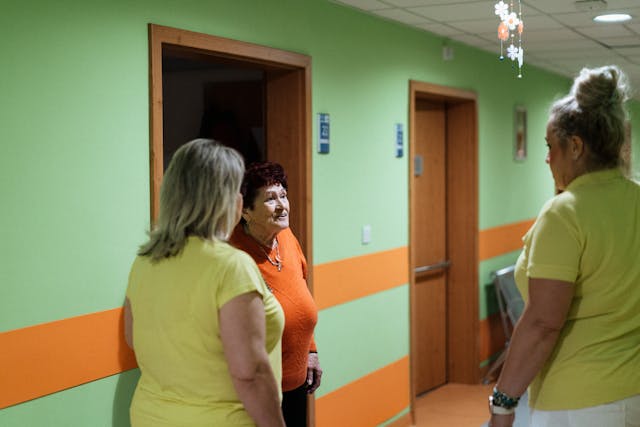When it comes to deciding on the best living arrangement for a senior loved one, there are many options to consider elder care living facility. Two common choices are senior assisted living and nursing homes. Both types of elder care living facilities provide varying levels of care, depending on the individual’s needs. Understanding the differences between these two options is essential for making an informed decision that suits both the health requirements and lifestyle preferences of your loved one.
In this post, we will explore the benefits and challenges of senior assisted living versus nursing homes, helping you determine which choice is most appropriate for your family member.
What is senior assisted living?
Senior assisted living is a type of elder care living facility that offers housing and various levels of care for seniors who require assistance with daily activities but still want to maintain a level of independence. This facility type is ideal for seniors who are relatively healthy but need help with tasks such as bathing, dressing, or medication management. Residents in assisted living communities generally do not require around-the-clock medical care, but they can access staff assistance as needed.
The primary focus of senior assisted living is to promote independence and provide support with everyday activities. This allows seniors to maintain a sense of dignity while benefiting from professional care when required.
Benefits of Senior Assisted Living
-
Independent Living with Support
Seniors in assisted living facilities can live as independently as possible, with assistance available for specific needs. For those who may struggle with mobility, basic housekeeping, or managing medications, having professional support nearby can make a huge difference.
-
Social Engagement
Most assisted living facilities offer a wide range of social and recreational activities. This helps residents stay active, both mentally and physically, reducing the risk of loneliness and depression.
-
Modified Care Plans
Assisted living offers a range of services, from minimal support to more intensive care. This allows families to adjust the level of care as their loved one’s needs change over time.
Challenges of Senior Assisted Living
-
Limited Medical Care
While senior assisted living facilities provide help with personal care and daily activities, they do not typically offer skilled nursing services. Seniors with complex medical needs or chronic conditions may need to look elsewhere.
-
Costs
Assisted living is often less expensive than nursing homes, but it can still be costly, particularly for those who need a high level of personal care or accommodations.
What are nursing homes?
Nursing homes, also known as skilled nursing facilities, provide a higher level of care for seniors who have significant medical needs or disabilities. These elder care living facilities offer 24-hour medical supervision and provide care for residents who require regular attention from licensed nurses and other medical staff.
Unlike senior assisted living, nursing homes focus on medical care and recovery. Residents typically have serious health issues that require frequent treatment, rehabilitation, or monitoring. Nursing homes are well-equipped to care for individuals recovering from surgeries, strokes, or severe illnesses, and they offer services like physical therapy and medication management.
Benefits of Nursing Homes
-
Comprehensive Medical Care
Nursing homes provide round-the-clock care, which includes monitoring vital signs, managing medications, and assisting with medical procedures. Skilled nursing staff are available to address medical emergencies or complex health needs, making them the right choice for individuals with serious health conditions.
-
Rehabilitation Services
Many nursing homes provide rehabilitation services, including physical, occupational, and speech therapy. This can help seniors recover after surgery or illness, supporting their long-term health and independence.
-
Specialized Care
Nursing homes are equipped to care for seniors with chronic health conditions, disabilities, or those who need help with both medical and personal needs. They have specialized services for conditions such as Alzheimer’s or Parkinson’s disease, which require more intensive care.
Challenges of Nursing Homes
-
Limited Independence
Nursing homes offer less autonomy than assisted living. The primary focus is on medical care, which means that residents might not have as much control over their daily routines as they would in an assisted living facility.
-
Social Isolation
Due to the intensive medical focus, nursing homes might not offer as many recreational activities as assisted living facilities. Residents can sometimes feel isolated or disconnected from the community.
-
Higher Costs
Nursing homes generally come with higher costs compared to assisted living. The constant medical supervision and specialized services contribute to the higher price tag, making it less affordable for some families.
Which Option Is Right for Your Loved One?
Deciding between a senior assisted living facility and a nursing home depends largely on the medical and personal care needs of your loved one. It’s important to assess your family member’s health status, lifestyle preferences, and financial situation when making this decision.
Here are some guidelines to help you choose:
When to Consider Senior Assisted Living
- Health Status: If your loved one is relatively independent but requires help with day-to-day tasks like bathing, dressing, or managing medication, senior assisted living might be the best option.
- Social Engagement: For seniors who enjoy social activities, assisted living communities provide many opportunities for socialization.
- Financial Considerations: Assisted living is often more affordable than nursing homes, especially for those who do not need round-the-clock medical care.
When to Consider Nursing Homes
- Health Issues: If your loved one has complex medical conditions that require constant supervision, nursing homes are better suited to provide specialized care.
- Recovery Needs: Seniors recovering from surgery, illness, or injury often benefit from the professional care available in nursing homes.
- Specialized Care: For individuals with Alzheimer’s, dementia, or other chronic health conditions, nursing homes provide dedicated staff and services that are modified to these needs.
Conclusion
Choosing the right elder care living facility for your loved one is a significant decision that requires careful thought and consideration. Whether you opt for a senior assisted living facility or a nursing home, the key is ensuring that the chosen facility aligns with your loved one’s healthcare needs, lifestyle, and financial capabilities.
Senior assisted living offers a balanced combination of independence and support for those who require help with daily activities but do not need extensive medical care. On the other hand, nursing homes provide the highest level of medical supervision and are ideal for seniors with complex health issues or those who need intensive, round-the-clock care.
Whichever option you choose, make sure to visit the facility, meet the staff, and ask plenty of questions to confirm that your loved one receives the care they deserve.












